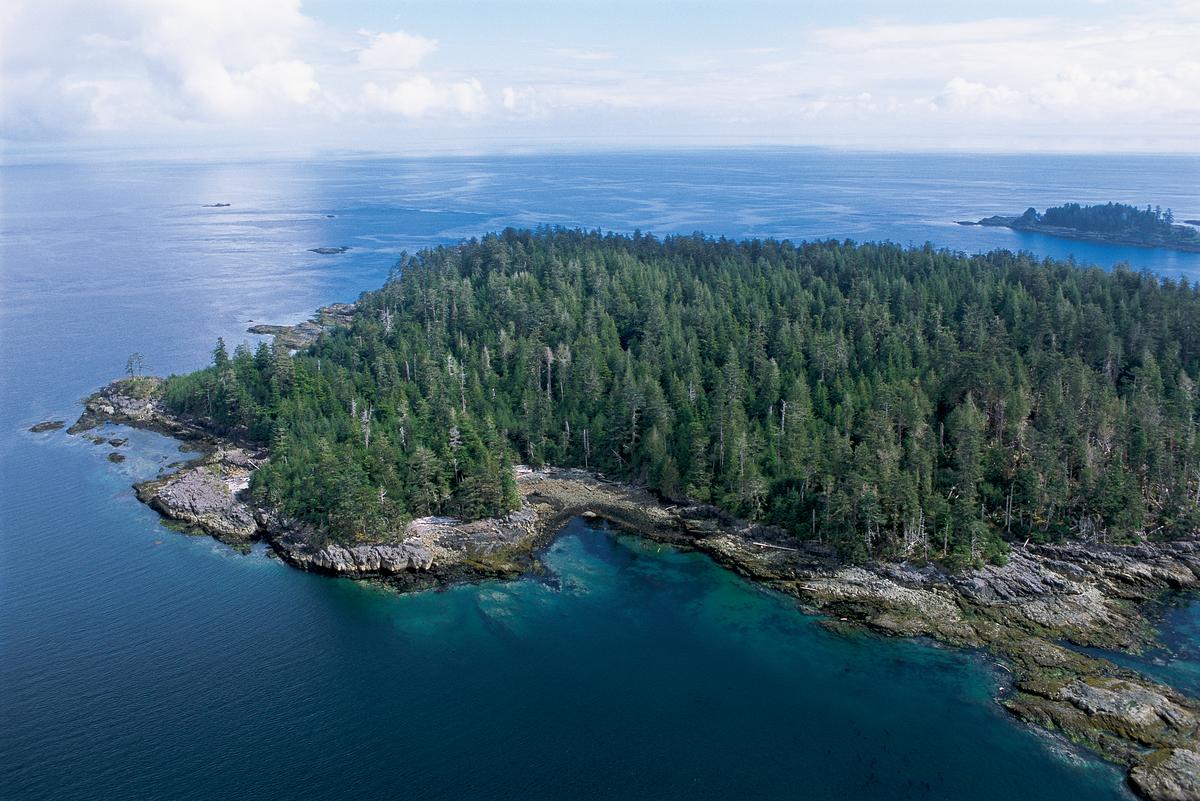
An aerial view of an island in Gwaii Haanas National Park Reserve/Destination BC, JP Bergeron
A significant British Columbia court case involving illegal fishing was finalized on April 21 against the commercial master of the vessel Wind Walker.
Silas Miro Levesque was found guilty of fishing for lingcod in a culturally significant closed area inside the Gwaii Haanas National Park Reserve, National Marine Conservation Area Reserve, and Haida Heritage Site.
Prince Rupert Provincial Court Judge Paul Dohm ordered Levesque, who pleaded guilty on February 18, to pay a $20,000 ($16,500 USD) fine for violations of Canada's Fisheries Act between October 30, 2018 and May 4, 2019. The Judge also ordered Levesque to pay an additional $25,000 ($20,500 USD) as a 79.2 court order, to go towards the conservation and protection of fish and fish habitat on and around Haida Gwaii.
According to electronic monitoring data, Levesque was fishing in a Strict Protection Zone that was closed to fishing as part of the marine zoning plan within the Land-Sea-People Management Plan.

Zones and access information for Gwaii Haanas/CNW Group, Fisheries and Oceans Canada, Pacific Region
This area was identified as an ecologically important and culturally sensitive area adjacent to a Haida village site protected by the Haida Nation and Parks Canada, and is recognized by UNESCO as a World Heritage Site. The site commemorates the living culture of Haida people and their relationship to the land and sea.
“The significant penalties order by the Court in this case underscores the seriousness of violating fishing rules and regulations under Canada's Fisheries Act intended to protect and preserve at-risk fish populations and vital ecosystems now, and for the future,” Fisheries and Oceans Canada, Pacific Region, said in a news release.
Fisheries and Oceans Canada protects and conserves marine resources and prosecutes offenders under the Fisheries Act. It ensures and promotes compliance with the act and other laws and regulations through a combination of land, air and sea patrols, as well as education and awareness activities.
The department asks the public to call the toll-free violation reporting line at 1-800-465-4336, or email [email protected].
In 2010, Canada committed to conserving 10 per cent of coastal and marine areas through effectively managed networks of protected areas and other effective area-based conservation measures (OECMs) by 2020. In 2018, Canada further committed to supporting strategies to protect and manage vulnerable areas of its oceans and resources by establishing effective and science-based marine protected areas (MPAs) and OECMs.
Canada has already conserved nearly 14 per cent of its oceans and there are currently 14 Oceans Act Marine Protected Areas (MPAs) across the country, comprising more than 350,000 square kilometres or roughly six per cent of Canada’s marine and coastal areas.
Protected areas include Marine Protected Areas created under the Oceans Act, National Marine Conservation Areas, and marine portions of National Wildlife Areas, Migratory Bird Sanctuaries, National Parks, and provincial protected areas. Protected areas and other OECMs contribute to marine conservation targets. To date, all areas that qualify as OECM have been fisheries area closures. Fisheries area closures that meet OECM criteria are known as “marine refuges.”
Gwaii Haanas and the Haida Heritage Site are cooperatively managed by the Council of the Haida Nation and the Government of Canada (Parks Canada/DFO) through the Archipelago Management Board.
The Gwaii Haanas marine area was officially designated a National Marine Conservation Area Reserve and Haida Heritage Site in 2010. The Gwaii Haanas Land-Sea-People Plan was completed in 2018, with input from partners, stakeholders and the general public.
As of May 1, 2019, commercial and recreational fishing is prohibited in the strict protection zones of the Gwaii Haanas National Marine Conservation Area Reserve and Haida Heritage Site.

 Support Essential Coverage of Essential Places
Support Essential Coverage of Essential Places



